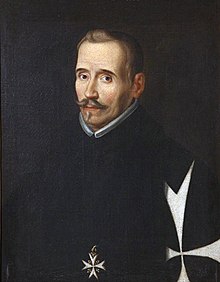Lope de Vega
| Lope de Vega | |
|---|---|

Portrait of Lope de Vega
|
|
| Born | Félix Lope de Vega y Carpio 25 November 1562 Madrid, Spain |
| Died | 27 August 1635 (aged 72) Madrid, Spain |
| Occupation | Poet, playwright |
| Language | Spanish |
| Literary movement | Baroque |
| Notable works |
Fuente Ovejuna The Dog in the Manger Punishment Without Revenge |
Félix Lope de Vega y Carpio (Spanish pronunciation: [ˈfeliks ˈlope ðe ˈβeɣa i ˈkarpjo]; 25 November 1562 – 27 August 1635) was a Spanish playwright, poet and novelist. He was one of the key figures in the Spanish Golden Century of Baroque literature. His reputation in the world of Spanish literature is second only to that of Cervantes, while the sheer volume of his literary output is unequalled, making him one of the most prolific authors in the history of literature.
Nicknamed "The Phoenix of Wits" and "Prodigy of Nature" (in Spanish: Fénix de los Ingenios, Monstruo de la Naturaleza; because of the volume of his work) by Miguel de Cervantes, Lope de Vega renewed the Spanish theatre at a time when it was starting to become a mass cultural phenomenon. He defined its key characteristics, and along with Calderón de la Barca and Tirso de Molina, took Spanish Baroque theatre to its greatest heights. Because of the insight, depth and ease of his plays, he is regarded as one of the greatest dramatists in Western literature, his plays still being produced worldwide. He was also one of the best lyric poets in the Spanish language, and author of several novels. Although not well known in the English-speaking world, his plays were presented in England as late as the 1660s, when diarist Samuel Pepys recorded having attended some adaptations and translations of them, although he omits mentioning the author.
Some 3,000 sonnets, 3 novels, 4 novellas, 9 epic poems, and about 500 plays are attributed to him. Although he has been criticised for putting quantity ahead of quality, nevertheless at least 80 of his plays are considered masterpieces. He was a friend of the writers Quevedo and Juan Ruiz de Alarcón, and the volume of his lifework made him envied by not only contemporary authors such as Cervantes and Góngora, but also by many others: for instance, Goethe once wished he had been able to produce such a vast and colourful oeuvre.
...
Wikipedia
